15 Enthralling Facts About Sunscreen
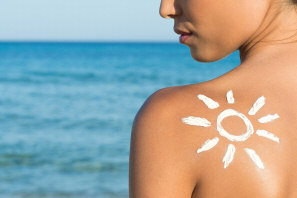 Skin cancer has grown to be the most common form of cancer in the United
States. This has sparked a lot of controversy and speculation over the
effectiveness of sunscreens. Prior to the past several years, there were never
any sunscreens that were labeled at SPF 60 or SPF 100. These high numbers seem
to indicate that they offer the user an exceptionally strong amount of
protection against the sun's damaging rays. It turns out that this is not the
case. Skin cancer has grown to be the most common form of cancer in the United
States. This has sparked a lot of controversy and speculation over the
effectiveness of sunscreens. Prior to the past several years, there were never
any sunscreens that were labeled at SPF 60 or SPF 100. These high numbers seem
to indicate that they offer the user an exceptionally strong amount of
protection against the sun's damaging rays. It turns out that this is not the
case.
Using sunscreen has never been as important as it is today. With the changes
that are occurring to the earth's atmosphere as far as the ozone depleting,
people are at danger of
developing skin damage from the sun. The skin damage that occurs from the sun's
rays can eventually lead to skin cancers. Every person should use sunscreen to
protect themselves from being one of the 3.5 million people who are diagnosed
with skin cancer annually in America. New skin cancer occurrences are more common
than breast, prostate, and lung cancer occurrences combined. Understanding
sunscreen, and how to use it properly is very important, because it is one of
the best ways of protecting yourself from skin cancer. Although using sunscreen
is very important, it should also be done in addition to limiting sun exposure,
wearing sunglasses, and wearing protective clothing.
15) Regardless of Your Skin Type You Need to Wear Sunscreen
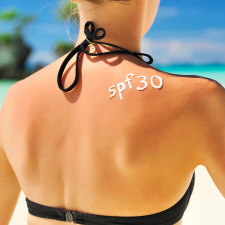 All skin types and
skin tones should practice good sun protection habits. The effects of the sun
are most obvious on people with fair or light skin. However, just because you
have dark skin does not mean you should not be using sunscreen. The effects of
the sun, like burns, are less visible on dark skin. This does not mean that they
are not damaging the skin. Everyone from fair skinned people, to Hispanic
people, to dark skinned African Americans should be practicing proper skin care
practices. Darker skin inherently has higher amounts of melanin. This provides
it with a greater amount of protection. This can be a double-edge sword. Dark
skin is less likely to get skin cancer, but it also makes detecting skin cancer
more difficult. Dark skin provides dark skinned people with a false sense of
security, according to Dr. H. Gloster, who conducted a study at Cincinnati
University. This leads to higher mortality rates due to presence of skin cancer,
and it being much more difficult to detect it in patients who have darker skin. Very dark skin has a natural SPF of about 13.
Even with this natural protection, it is not enough to protect the skin from the
harmful effects of the sun. The rule of thumb is the fairer your skin tone, the
higher SPF rating you need. Dermatologists recommend that every person
consistently use an SPF 15 product on their skin. All skin types and
skin tones should practice good sun protection habits. The effects of the sun
are most obvious on people with fair or light skin. However, just because you
have dark skin does not mean you should not be using sunscreen. The effects of
the sun, like burns, are less visible on dark skin. This does not mean that they
are not damaging the skin. Everyone from fair skinned people, to Hispanic
people, to dark skinned African Americans should be practicing proper skin care
practices. Darker skin inherently has higher amounts of melanin. This provides
it with a greater amount of protection. This can be a double-edge sword. Dark
skin is less likely to get skin cancer, but it also makes detecting skin cancer
more difficult. Dark skin provides dark skinned people with a false sense of
security, according to Dr. H. Gloster, who conducted a study at Cincinnati
University. This leads to higher mortality rates due to presence of skin cancer,
and it being much more difficult to detect it in patients who have darker skin. Very dark skin has a natural SPF of about 13.
Even with this natural protection, it is not enough to protect the skin from the
harmful effects of the sun. The rule of thumb is the fairer your skin tone, the
higher SPF rating you need. Dermatologists recommend that every person
consistently use an SPF 15 product on their skin.
14) People Should Regularly Examine Their Moles
Sunscreen is used to protect
the skin from developing skin cancer. It takes twenty years before the damages
of the sun develop into skin cancer, according to pathologist and dermatologist
Dr. Cockerell. Skin cancer is the most common form of cancer in the U.S. It
affects one in five Americans in their lifetime. The image below is a
schematic of a basal cell carcinoma - a type of skin cancer.
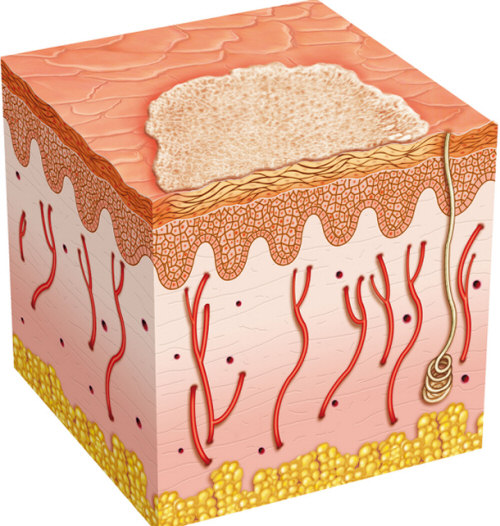
Most skin cancers develop over time, which is why it is important for people
to regularly monitor their skin for moles and sunspots. Most cancers happen
within the body. The only upside of skin cancer is that melanoma makes itself
obvious. There are a series of steps people should follow to regularly monitor
themselves for the appearance of skin cancer. An asymmetrical mole could be a
sign that it is potentially cancerous. If the edges of a mole are not smooth, it
could also be a sign that it is dangerous. Regular moles and spots have smooth
borders, whereas cancerous moles look irregular. Most moles are also uniform in
color. Cancerous moles have color irregularities. People who develop moles that
are larger in size than a pencil eraser should consult a dermatologist. The
final way to monitor moles on the skin as potential sign of skin cancer is if
they change over time. The American Skin Cancer Foundation recommend that people
undergo this spot-check monthly, so they can get to know what is normal and what
is not.
13) A Higher SPF Rating is Not Necessarily Better Protection
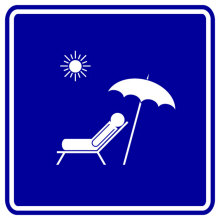 It is common for
people to assume that SPF 30 is twice as effective as SPF 15, but this is not
the case. The FDA revised its rating of SPF products in 2013, after
controversies surrounding the effectiveness of products labeled and marketed
with high SPF ratings. A 2012 study by the Environmental Working Group found
that very few products labeled with SPF ratings over 50, were actually any more
effective than an SPF 50. Researches of the study concluded that few people
require anything higher than an SPF 30. The SPF 30 should, however, be reapplied
every few hours when exposed to the sun. It is common for
people to assume that SPF 30 is twice as effective as SPF 15, but this is not
the case. The FDA revised its rating of SPF products in 2013, after
controversies surrounding the effectiveness of products labeled and marketed
with high SPF ratings. A 2012 study by the Environmental Working Group found
that very few products labeled with SPF ratings over 50, were actually any more
effective than an SPF 50. Researches of the study concluded that few people
require anything higher than an SPF 30. The SPF 30 should, however, be reapplied
every few hours when exposed to the sun.
The difference in SPF ratings are not equal, but proportional. For example,
an SPF 50, if used properly, can protect a person from 97 percent of dangerous
sunrays. An SPF 100 is only slightly more effective, with a 98.5 percent
protection rate. The difference is negligible, and most consumers use high SPF
sunscreens as a false sense of security.
The proper way to use sunscreen is to use one with an SPF rating between 15
and 30. For prolonged sun exposure, sunscreen should be reapplied every two
hours. Only people with very fair skin, and young children, need to use SPF
sunscreens with ratings up to 50. SPFs above 50, offer insubstantial increased
benefits.
12) Seeking Shade is More Effective Than Sunscreen
 The reality of sunscreen
use is that most people misuse it. They either do not use it at all, or are not
using enough of it. Researches at the Department of Dermatology of Stanford have
found that seeking shade is a much more effective way of protecting yourself
from sun damage. For people who use sunscreen the way that the average American
does, chances are it is not very effective. Many people also keep their
sunscreen bottles year after year, only pulling them out in the summer months or
for vacations. Sunscreen loses its effectiveness with age. If a sunscreen has
been sitting unused for months, or years, it is better that it be thrown out.
Instead of worrying about if the sunscreen being used is effective, it may be
better to take other protective measures. On days when hours are being spent
outdoors, find shade to be in. People are better off avoiding being in the sun
between the hours of 11 a.m. and 3 p.m. altogether. This is when the sun's UV
rays are at their strongest. The reality of sunscreen
use is that most people misuse it. They either do not use it at all, or are not
using enough of it. Researches at the Department of Dermatology of Stanford have
found that seeking shade is a much more effective way of protecting yourself
from sun damage. For people who use sunscreen the way that the average American
does, chances are it is not very effective. Many people also keep their
sunscreen bottles year after year, only pulling them out in the summer months or
for vacations. Sunscreen loses its effectiveness with age. If a sunscreen has
been sitting unused for months, or years, it is better that it be thrown out.
Instead of worrying about if the sunscreen being used is effective, it may be
better to take other protective measures. On days when hours are being spent
outdoors, find shade to be in. People are better off avoiding being in the sun
between the hours of 11 a.m. and 3 p.m. altogether. This is when the sun's UV
rays are at their strongest.
It is also important not to forget other protective measures. People should
always wear sunglasses when outside, to protect their eyes from the sun. Eyes
are not exempt from being damaged by the sun. People can also practice good sun
behavior by using beach umbrellas and other forms of protective clothing when
they are out in the sun or at the beach.
11) Most People Do Not Apply Enough Sunscreen
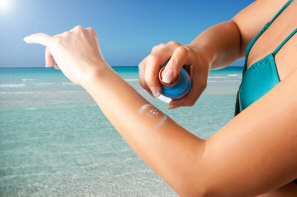 To
receive the ideal protective benefits of sunscreen, a lot of it has to be used.
A person's skin needs to be generously coasted, and allowed to be absorbed into
the skin. This means applying sunscreen about 15-30 minutes before going out
into the sun. Every part of the skin that is not covered by clothing needs to be
considered. Most dermatologists recommend that people use approximately one
ounce of sunscreen. The correct amount will
depend on the size of your body, and how much of your skin will be exposed.
Sunscreen should be re-applied every two hours, or more often if it gets washed
off. Most people only apply about 25% of the amount of sunscreen that they need.
No part of the body should be neglected, including the part in a person's hair,
and lips. Lips, like the skin, are also very prone to sun damage. The skin of
the lips is more delicate than the rest of the body, so an SPF 30 lip balm
should be applied regularly as well. To
receive the ideal protective benefits of sunscreen, a lot of it has to be used.
A person's skin needs to be generously coasted, and allowed to be absorbed into
the skin. This means applying sunscreen about 15-30 minutes before going out
into the sun. Every part of the skin that is not covered by clothing needs to be
considered. Most dermatologists recommend that people use approximately one
ounce of sunscreen. The correct amount will
depend on the size of your body, and how much of your skin will be exposed.
Sunscreen should be re-applied every two hours, or more often if it gets washed
off. Most people only apply about 25% of the amount of sunscreen that they need.
No part of the body should be neglected, including the part in a person's hair,
and lips. Lips, like the skin, are also very prone to sun damage. The skin of
the lips is more delicate than the rest of the body, so an SPF 30 lip balm
should be applied regularly as well.
Spray sunscreens have become more popular in the past few years. People
prefer them because they are easier to apply. Dermatologists recommend that
people using spray sunscreens apply two coats to their bodies. This will ensure
that the amount necessary has been applied to the skin.
10) Most of a Person's Sun Exposure Occurs During Childhood
Protecting
children from sun exposure is very important. The primary reason is because they
are unable to do it themselves. Also, children's skin is more delicate and
susceptible to sun damage. Most of the sun damage that happens to a person
happens before the age of 18. Eighty percent of a persons skin damages happens
before a child enters their teenage years.
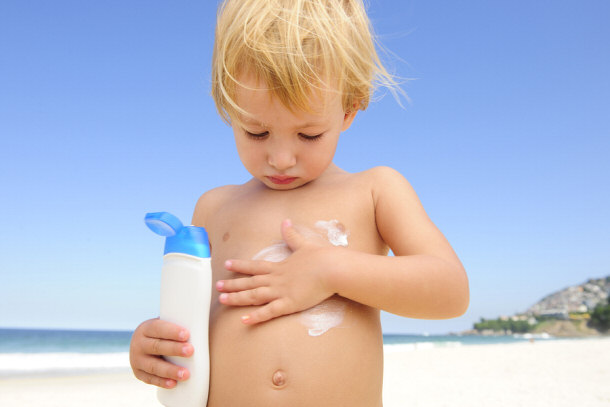
9) People Should Always Use Skin Cancer Foundation Recommended Sunscreen
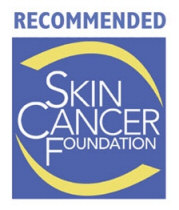 The
Skin Cancer Foundation is the primary authority of skin protection and skin
caner in the United States. People should always use sun protection products
that receive the Skin Care Foundation's Seal of Approval. The foundation has
approved over 600 products that are effective. These products are also endorsed
because they are resistant to moisture as well as safe for sensitive skin. They
endorse traditional and international products for activity, as well as daily
use. People can spot the seal on cosmetic products, moisturizers, sun protective
clothing, as well as sunscreens. This approval ensures that the product has not
been falsely marketed, and that its SPF rating is accurate. When you are
looking for a safe and effective sunscreen make sure that the product you are
intending to purchase has this seal. The
Skin Cancer Foundation is the primary authority of skin protection and skin
caner in the United States. People should always use sun protection products
that receive the Skin Care Foundation's Seal of Approval. The foundation has
approved over 600 products that are effective. These products are also endorsed
because they are resistant to moisture as well as safe for sensitive skin. They
endorse traditional and international products for activity, as well as daily
use. People can spot the seal on cosmetic products, moisturizers, sun protective
clothing, as well as sunscreens. This approval ensures that the product has not
been falsely marketed, and that its SPF rating is accurate. When you are
looking for a safe and effective sunscreen make sure that the product you are
intending to purchase has this seal.
8) Sunscreen is Not Just for the Beach
 Most people only think of using
sunscreen when there are heading on vacation or holiday. However, day-to-day sun
exposure can also be dangerous. Sunscreen should be used on every day that the
sun is out, regardless of the season. During the warm months it should be used
daily, regardless of the amount of cloud cover. The sun's reflective power is
significant. 80% of the sun's rays are reflected off of snow, compared to only
17% of rays reflected off of sand. This is why sunscreen is also important for
people who live in sunny, albeit snowy, places. Sunscreen use while skiing is
also important because of the elevations reached. For every 1,000 foot increase
in elevation, the sun's UV radiation increases by 4%. This is why some of the
snowiest places in North America are also the sunniest. Most people only think of using
sunscreen when there are heading on vacation or holiday. However, day-to-day sun
exposure can also be dangerous. Sunscreen should be used on every day that the
sun is out, regardless of the season. During the warm months it should be used
daily, regardless of the amount of cloud cover. The sun's reflective power is
significant. 80% of the sun's rays are reflected off of snow, compared to only
17% of rays reflected off of sand. This is why sunscreen is also important for
people who live in sunny, albeit snowy, places. Sunscreen use while skiing is
also important because of the elevations reached. For every 1,000 foot increase
in elevation, the sun's UV radiation increases by 4%. This is why some of the
snowiest places in North America are also the sunniest.
On cloudy days, 80% of the sun's UV rays can permeate through cloud cover.
Even if the sun is not visible, its effects are still there. There are cosmetic
products for both men and women that have SPF ratings. Using cosmetics and
moisturizers that have at least an SPF of 15 will ensure that we are meeting the
minimal requirements of sun protection.
7) Some Sunscreens Affect People's Hormonal Balance
When we apply sunscreen
on our skin, we believe that we are doing something good for our skin. Although this
is mostly true because we need sunscreen or sunblock to protect ourselves from skin
cancer, we do not think about how and what chemicals we are slathering on our
skin. The chemical ingredients in sunscreen are potential toxins, which are
detrimental to a person's health. High level of toxins in the body inhibits the
body's natural ability to ward off diseases and prevent cancerous cells from
forming. Research has shown that sunscreen could be tampering with our body's
natural hormonal balances. The image below shows cancer cells forming
among healthy cells.
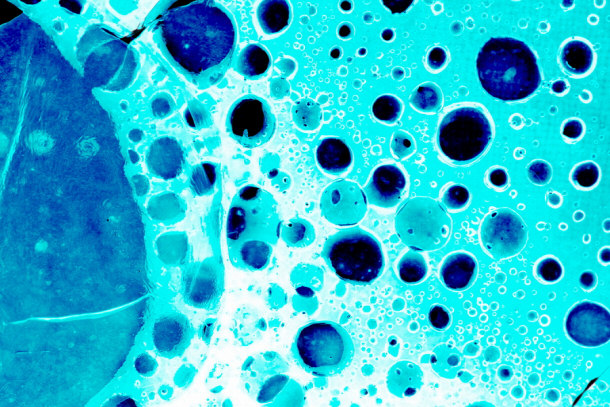
A 2011 study "Current sunscreen controversies" shows that an ingredient in
sunscreens imitates the effects of estrogen in our bodies. This ingredient is
called oxybenzone. Oxybenzone is an ingredient found in many topical skin
ointments such as acne medications. Most people are safe from the effects of
this potentially toxic chemical. In
order for the ingredient to have an actually significant effect on a person's
hormonal levels, they would need to overuse sunscreen. Hormonal imbalances in the body can have adverse effects. With the estrogen
hormone, the effects are especially potentially detrimental to men, who only
produce small amounts of the hormone naturally. High levels of estrogen, in both
men and women, can increase a person's risk of breast cancer.
6) It is Important to Use Sunscreens with Free Radical Damage Protection
 Sunscreens are supposed to protect the skin from free radical damage. However,
studies have shown that is can also encourage free radical damage to occur. This
is caused by the ingredient oxybenzone. However, it is possible for people to
avoid this from becoming a problem by using natural products. Natural sunscreen
may be more expensive, but the advantages
are defiantly worth the price. Unlike most sunscreens, they contain limited toxic
ingredients, including those that encourage free radical damage. Having a
non-toxic cream is more desirable. Sunscreen is a product people should be
slathering large doses of onto their skin. It is better for the health of our
skin to use natural products rather than those with are loaded with potentially
toxic chemicals that add to the risk of cancerous cells forming, rather than
decreasing it. Sunscreens are supposed to protect the skin from free radical damage. However,
studies have shown that is can also encourage free radical damage to occur. This
is caused by the ingredient oxybenzone. However, it is possible for people to
avoid this from becoming a problem by using natural products. Natural sunscreen
may be more expensive, but the advantages
are defiantly worth the price. Unlike most sunscreens, they contain limited toxic
ingredients, including those that encourage free radical damage. Having a
non-toxic cream is more desirable. Sunscreen is a product people should be
slathering large doses of onto their skin. It is better for the health of our
skin to use natural products rather than those with are loaded with potentially
toxic chemicals that add to the risk of cancerous cells forming, rather than
decreasing it.
5) Sunscreens Can Promote Cancer Rather Than Prevent It
There are a wide
variety of chemical ingredients that exist in most sunscreens that are not good
for the body. Powerful sunscreens are thick and white in color. Some sunscreens
contain nanoparticles, which help decrease the visibility of the white particles
on the skin. These chemicals are in the form of titanium dioxide and zinc oxide.
The particles can encourage free radical formation, especially in the presence
of light. Zinc is used as an ingredient in sunscreens. Potent zinc creams are
used by people who ski, as well as lifeguards, on their faces as a powerful
defense against sunburns. It is also found in sunblock lip balms, which are very
easily digested if consumed orally. Below is a schematic of squamous cell
carcinoma, a type of skin cancer.
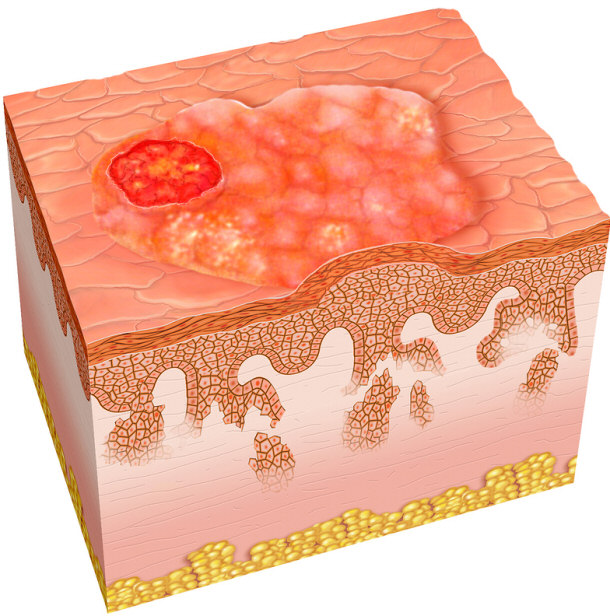
Although the TGA warns people about the potentially harmful effects of zinc
oxide and titanium oxide, this is only a problem in extreme cases. Most people
will be unaffected by these chemicals, as they would have to be absorbed deep
into the skin. Potent zinc creams are not easily absorbed by the skin. Instead
they are a topical cream that rests on the skin, and is easily washed or sweat
off.
4) Certain Foods Can Act as Sunscreens
 Although there is no way to
completely protect your skin by eating certain foods, these are foods that can
help prevent skin damage from occurring. Antioxidant foods have the ability to
prevent cellular damage caused by the sun. They will also help your body by
repairing the skin damage that has already occurred. These are antioxidant foods
that are rich in vitamin C and E. You can get these benefits by including foods
like tomatoes, peppers, broccoli, and melons in your daily diet. It is also
beneficial to eat foods rich is fatty acids, like fish, nuts like almonds, and
avocados. Fatty fish is also a good source of vitamin D, which your body needs
and usually gets from the sun. Although there is no way to
completely protect your skin by eating certain foods, these are foods that can
help prevent skin damage from occurring. Antioxidant foods have the ability to
prevent cellular damage caused by the sun. They will also help your body by
repairing the skin damage that has already occurred. These are antioxidant foods
that are rich in vitamin C and E. You can get these benefits by including foods
like tomatoes, peppers, broccoli, and melons in your daily diet. It is also
beneficial to eat foods rich is fatty acids, like fish, nuts like almonds, and
avocados. Fatty fish is also a good source of vitamin D, which your body needs
and usually gets from the sun.
Even if your diet includes these healthy antioxidant and nutrient rich foods,
it is not enough to substitute the use of sunscreen. They will help your body
run and function properly. Having a healthy functioning body is essential to the
reparation of dead cells that can potentially become cancerous. Having a healthy
diet is an additional way you can help protect your body from becoming prone to
skin cancer.
3) Sunscreen Does Not Protect You From all UV Rays
The sun radiates three
types of ultraviolet rays: UVA, UVB, and UVC. UVA is the radiation that people
have been most concerned about. However, due to the changing atmosphere of the
earth, a new concern is the effects of UVB radiation. Most sunscreens only
protect us from the UVA rays of the sun. UVA rays are the most intense
ultraviolet rays. They can be up to 50 times more powerful than UVB rays,
according to the Skin Cancer Foundation.
UVB rays are a new concern as the earth's stratosphere allows more of the
sun's dangerous radiation to permeate the atmosphere. People today have higher
exposure to UVB rays than any generation before. It is important to find
sunscreens that protect against both UVA and UVB radiation.

People do not have to worry about UVC radiation, because it has no effect on
a person's chance of developing skin cancer. The type of UV is characterized by
its wavelength. UVA and UVB rays are high and mid-range wavelengths,
respectfully. The dramatic increase of melanoma incidents since the 1960s is
attributed to increase of UVB rays affecting people. The increase of UVB rays is
a result of the deterioration of the earth's ozone.
2) Sunscreen Limits Your Body's Ability to Get Vitamin D
 Vitamin D is an
essential mineral that the human body requires. It is one of the only minerals
that humans cannot synthesize naturally. Instead, we get it from vitamin D rich
fishes like tuna, sardines, and herring. Some juices and other food products
enrich their products with vitamin D supplements. People who live in places of
the world that get a lot of sun can get their required doses of
vitamin D from
10 minutes of daily sun exposure. It is equivalent to 10,000 units of vitamin D.
However, people who live in areas of the world that have limited sun exposure
throughout the year need to ensure they are getting the adequate amount of the
vitamin. Studies have shown that Canadians need to be more careful about getting
enough vitamin D, because of the lack of sun in their climate. The same would
also apply to people who live in the northern United States. Approximately
one-third of the population is vitamin D deficient. Vitamin D is an
essential mineral that the human body requires. It is one of the only minerals
that humans cannot synthesize naturally. Instead, we get it from vitamin D rich
fishes like tuna, sardines, and herring. Some juices and other food products
enrich their products with vitamin D supplements. People who live in places of
the world that get a lot of sun can get their required doses of
vitamin D from
10 minutes of daily sun exposure. It is equivalent to 10,000 units of vitamin D.
However, people who live in areas of the world that have limited sun exposure
throughout the year need to ensure they are getting the adequate amount of the
vitamin. Studies have shown that Canadians need to be more careful about getting
enough vitamin D, because of the lack of sun in their climate. The same would
also apply to people who live in the northern United States. Approximately
one-third of the population is vitamin D deficient.
Many people refrain from using sunscreen because it prevents them from
absorbing the natural vitamin D from the sun. Although this is true, people only
need a few minutes in the sun to get their daily vitamin D requirement. It is
most important to be diligent about applying sunscreen appropriately. Even if a
person uses sunscreen regularly, they are likely still not using it enough. This
means they are still getting their required vitamin D. There is no reason to be
worried about becoming vitamin D deficient if you use sunscreen. We can get
vitamin D from just a few minutes of sun exposure, as well as from certain foods
and vitamin enriched products. This is especially important for dark skinned
people because their skin makes it more difficult for their bodies to absorb
the vitamin where their higher levels of melanin protect them from sun
damage.
1) Using a Lot of Sunscreen May Not Prevent You From Getting Skin Cancer
The
main reason to use sunscreen is to prevent us from getting skin cancer. However,
it will not protect us from all forms of skin cancer. There are three forms of
skin cancer: basal cell carcinoma, melanoma, and squamous cell carcinoma. People
who are genetically prone to skin cancer have a much higher risk of developing
skin diseases than those who do not. This is particularly common among Caucasian
people. Fair skinned people, and people with a lot of freckles or moles are also
more likely to develop skin cancer. Using sunscreen is never 100% effective.
There will also be cases when a person is exposing themselves to the dangers of
the sun's ultraviolet rays. Regardless of the skin type of a person, anyone can
develop skin cancer. Exposure to the sun is not always in our control. Sun
damage that occurs at a young age can reappear later in life as skin cancer. It
is impossible to be completely protected against the sun's rays without
radically altering your lifestyle. Below is a schematic of the stages of
melanoma.

Final Words
Sunscreen brings up a lot of issues. It can be both good, and in some ways
bad, for us. Overall, the advantages of using sunscreen far outweigh the
potential disadvantages. If the disadvantages of what the chemicals are doing to
your skin and body are worrisome, there are ways to avoid them. The best way to
protect yourself from the damages of the sun is to actively seek shade when
spending time outdoors. Limit daily sun exposure to no more than 15 minutes.
Using organic or natural sunblock will help people avoid the potential downfalls
of the creams and lotions. It is important to practice preventative measures
against skin cancer. If a person is prone to skin cancer, either through
heredity or through sun exposure, it is important to monitor the changes in your
body's moles. Skin cancer is a growing form of cancer that is affecting more and
more people. It is important to know the features of sunscreen and understand
sun exposure to protect ourselves from being affected by skin cancer.
Skin Care
Top 10 Reasons Why Women Wear Makeup
15 Enthralling Facts About Sunscreen
9 Unusual Beauty Treatments
DIY Body Scrub
Creating Your Own Natural Perfume And Body Spray
DIY Natural Acne Scar Treatment Serum
Herbal Face Mask
Fruits That Will Make Your Skin Glowing Healthier
How Can Teenagers Prevent Acne Breakouts
Why Your Facial Skin is the Most Sensitive to Skincare Products
The Dangers of Products Containing Sodium Lauryl Sulfate
How to Choose The Right Makeup
Laser Hair Removal for Unwanted Hair Growth
Fight Acne with Strawberries!
Don't Cut Your Cuticles - Use a Cuticle Stick!
How to Get Healthy Glowing Facial Skin Without Breaking the Bank |